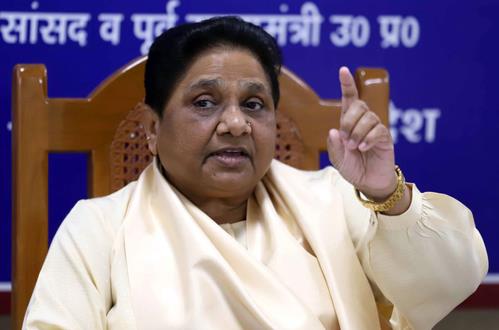
Two Decades On Mayawati Still Haunted By Taj Corridor, Rural Health Scams
Mayawati's equations with various political parties have changed with the charges levelled against her from time to time.
The first major charge that Mayawati faced as chief minister was the Taj Heritage Corridor case in 2002-2003, in which Mayawati and a minister in her government, Nasimuddin Siddiqui, were charged with corruption.
The Taj Corridor project was intended to upgrade tourist facilities near the Taj Mahal and was to be implemented during her tenure as Chief Minister. The then BJP government at the Centre gave the Environmental Clearance required for the project.
However, later on the BJP backed out and then started saying that the project was not cleared by the Environment Ministry and blamed Mayawati for starting construction work near the Taj Mahal.
The total estimated cost of the project was Rs 1.75 billion.
The project was started with the support of the BJP and was interrupted when Mayawati snapped ties with the BJP on 25 August 2003.
According to sources, the support for the corridor project came when Mayawati protected BJP leaders L K Advani, Murli Manohar Joshi and Uma Bharti from prosecution in the case of the demolition of the Babri Masjid by moving the trial on all charges, except the conspiracy charge, to a court in Rae Bareli.
It was alleged that Mayawati embezzled the money dedicated for this project. Initially, the case saw some rapid progress, when the CBI conducted extensive searches at her various addresses, and said that though she had claimed an income of only Rs 11 million during her tenure as chief minister, her bank balance in a single bank went up to Rs 25 million and the total assets held by her were estimated at Rs 150 million.
In September 2003 Ajay Agarwal, the former government counsel in the project, began accusing Mayawati of enriching herself from the corridor project and also stated that Mayawati had recently acquired property both in her name and that of her relatives.
However, later investigations slowed down even though the Supreme Court pulled up the CBI several times for its tardy progress in the case.
In June 2007, Uttar Pradesh Governor T. V. Rajeswar refused sanction to prosecute citing that there was insufficient evidence to prosecute Mayawati and the other accused.
In his 23-page order, he said: "the fact that the Mission Management Board, consisting of officers of both the State and the Central Government, regularly met and discussed the project and the fact that even a sum of Rs 170 million was spent through the Central Government public sector undertaking, NPCC, all go to show that the serious offences with which Mayawati and the Minister were charged do not stand scrutiny.”
On 5 November 2012, the Lucknow bench of the Allahabad High Court upheld the trial court's order to close the case for want of sanction to prosecute. It was thought that the case was effectively ended before going to trial.
The project is now defunct, and plans are being made to remove the partial construction near the Taj Mahal site and replace it with a low-tech forested greenbelt.
Another major scam that tarnished the image of the Mayawati government was the NRHM scam, in which top politicians and bureaucrats are alleged to have siphoned off a massive sum estimated at Rs 100 billion from the National Rural Health Mission (NRHM), a Central government program meant to improve health care delivery in the rural areas.
At least five people are said to have been murdered in an attempt to cover up large-scale irregularities. Several former ministers of the then ruling Bahujan Samaj Party have been investigated by the Central Bureau of Investigation.
The NRHM scam came to light after two Chief Medical Officers were murdered one after another in Lucknow.
Dr. Vinod Arya (October 2010) and Dr B. P. Singh (April 2011) were shot dead in broad daylight outside their homes by motorcycle borne assassins, using the same weapon.
Deputy CMO Y S Sachan, who was said to have had a role in the murders, was arrested, but died mysteriously while in custody. Subsequently, three other functionaries who were under investigation were also murdered or died under suspicious circumstances.
In November 2011, Babu Singh Kushwaha, former Minister of Family Welfare in Mayawati's government and health minister Anant Kumar Mishra were forced to resign following a media outcry after the murders of the two Chief Medical Officers remained unsolved.
Kushwaha was once considered a close confidant of Mayawati.
In July 2011, Lucknow chief medical officer (CMO) Dr A.K. Shukla was arrested on the charge of embezzlement of funds under NRHM.
The NRHM left behind a bloody trail as Vikas Gupta, a project manager for the NRHM, allegedly shot himself in Lucknow on 23 January 2012.
Deputy Chief Medical Officer Shailesh Yadav, deputy Chief Medical Officer of Varanasi, who was questioned by the CBI in connection with the NRHM scam in Uttar Pradesh, died in what the police are claiming was a road accident on 15 February 2012.
Mahendra Sharma, a clerk with the Health Department in Uttar Pradesh, was found dead in Lakhimpur on 16 February 2012.
Former Director Health Department, Dr Pawan Kumar Srivastava, was found dead in his house in Gorakhpur in Uttar Pradesh after he committed suicide on 10 January 2018.
--IANS
amita/bg

Legal Disclaimer:
MENAFN provides the information “as is” without warranty of any kind. We do not accept any responsibility or liability for the accuracy, content, images, videos, licenses, completeness, legality, or reliability of the information contained in this article. If you have any complaints or copyright issues related to this article, kindly contact the provider above.















Comments
No comment